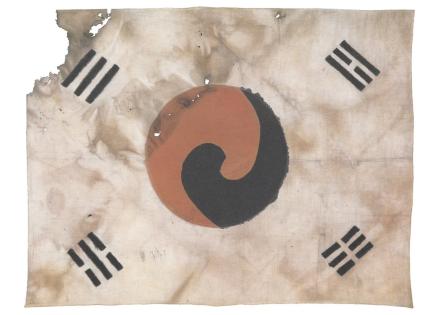

Taegeukgi from Jingwansa Temple in Seoul - a Korean flag painted over the flag of Japan @Korea Heritage Service
80 years ago, Korea regained its freedom, which had been lost during the Japanese Colonial Period. However, that sense of independence has gradually faded over the last decades. The cause is those who view history with a distorted perspective and a society that refuses to properly examine this distortion. For this reason, historical conflicts never seem to end in Korean society.
The New Right, which emerged in Korea with the spread of neo-liberalism in the late 20th century, invokes the theory of colonial modernization to justify its historical perspective. Led by former Seoul National University professor Rhee Young Hoon, they argue that “Joseon was already in crisis due to the collapse of its productive capacity in the 19th century,” and that “Japan’s colonial rule led to increased rice production and the expansion of railways and roads, which, as a result increased GDP per capita and led to modernization.”
However, this perspective has a critical flaw. While it is true that railways, roads, and telecommunications networks were built during the colonial period, these were intended to benefit the Japanese, not Koreans. The fact is that caloric intake per capita for Koreans declined from 1918 to 1945, whereas after liberation, there was a clear upward trend. Moreover, due to the tragedy of the Korean War, most of the facilities left by Japan were destroyed. This demonstrates that Korea’s post-liberation economic growth—often referred to as ‘The Miracle on the Han River’—was achieved independently from Japanese colonial rule. Nevertheless, the New Right ignores the suffering and sacrifice endured by the Koreans and insists on glorifying the Japanese Colonial Period as the foundation for Korea’s industrialization. This only serves to justify a pro-Japanese historical narrative and perpetuate distortions of history.
The New Right in Korea is staging a bold return. Kim Nak-nyeon, president of the Academy of Korean Studies, has claimed that “It was not that Japan plundered Korea’s rice, but rather that we exported it,” while Heo Dong-hyun, head of the National Institute of Korean History, tried to remove the bust of General Hong Beom-do who served as a commander of the Korean Independence Army. Such views persist because key positions in institutions of history and education have been dominated by New Right figures.
Colonial modernization theory is a dangerous ideology that glorifies Japan’s exploitation while denying the suffering of the Korean people and the value of the independence movement. It also hinders efforts to heal the pain left by colonial rule between Korea and Japan. Furthermore, through the publication of alternative textbooks, proponents of the theory seek to instill a distorted view of history into future generations. The ideology of the New Right should not be dismissed lightly. If left unchecked, it may deny the very foundations of Korea’s history. Now, more than ever, fostering a strong sense of historical awareness is urgent.
Reporters
Hyeonseon Namgung
namgung0121@seoultech.ac.kr
Myungjae Lee
swk08085@seoultech.ac.kr




 Comment 0
Comment 0 Posts containing profanity or personal attacks will be deleted
Posts containing profanity or personal attacks will be deleted